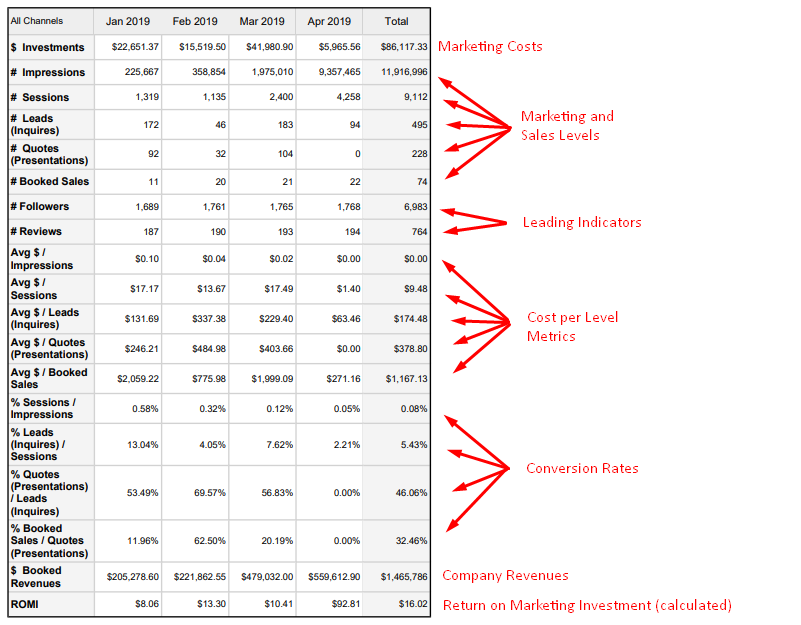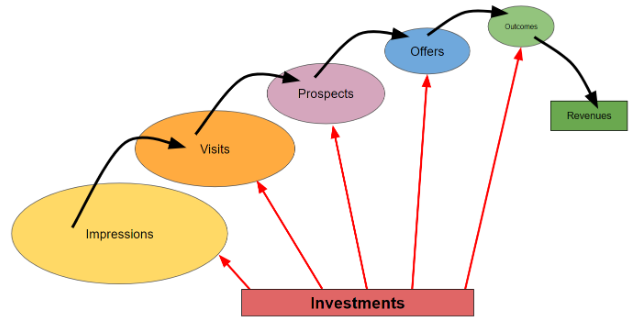Should Marketing be Efficient or Effective?
Efficiency or Effectiveness? This, of course, is the age-old question. But I have an opinion which I will share later. To start with let’s explore what is meant by efficiency and effectiveness when it comes to marketing and how these are measured.
Measuring performance
The first thing to do is set up a system so that we can measure marketing performance. Without a reliable system, it is next to impossible to tell what’s working and what isn’t.
Below is a screenshot from one of our clients who is using our Revenue Catalyst software. The measures are real. The metrics are calculated by the software.

Investments
These are the dollars that are spent (invested) on marketing
We can parse these investments by marketing channel but we won’t do that in this post
We include all costs related to marketing, advertising and related fees
We do not include in-house costs like salaries or overhead

Marketing Platforms (Levels)
Impressions, Visits, Product Pageviews, and Online Sales
These are the marketing levels (i.e. platforms) that prospects must land on, in the journey toward a sale
The more people on each platform the better but the platforms get smaller and smaller because only a percentage of people “level-up” to the next platform
Leading Indicators
Followers and Reviews (easily measured in the digital world)
These are "lead indicators" that are external to the marketing levels
The more followers and reviews, the better
Avg $ / Level
These are the average costs per level
These show us how efficient we are!
Lower is not always better
It is possible that the cost per sale could go up, but we would hope that sales and/or revenue also go up. If not, we have a problem.
If we make the decision to increase investments (higher costs), it may take a while to see improvements in sales and/or revenue. There is a lag time between first contact and the final sale. Such is life in the world of marketing.
Conversion Rates
These are the percentage of people who jump to the next level
These show us how effective we are!
Higher rates are always better
Revenues
This is the return - the rewards of our investments in marketing and our efforts
ROMI
Return on Marketing Investment
The calculation is [(Revenues - Investments) / Investments]
If the result is $10 then the expression is “For every $1 that we invested, we gained $10 in revenues.”
EFFICIENCY or Effectiveness
If I am forced to choose, I’ll choose effectiveness. I would prefer to have strong conversion rates.
Marketing is always going to require an investment. Sure, you can try to grow your company organically through word of mouth referrals, but growth will be slow. And truth be told, the investments are always more that hoped. Acquiring new customers is expensive. There is no getting around that.
My opinion is that if I’m forced to make a considerable investment in marketing then I want it to be effective. I want results and therefore, I focus on optimizing conversion rates. We can’t have a ROMI of $1; that doesn’t make any sense at all.
Let’s look at being efficient. Let’s say our ROMI is $100. That means that for every $1 that we invest in marketing we gain $100 in revenues. This sounds great but it isn’t. Every company that I have looked at where the ROMI is high has a low volume of sales and poor mediocre revenues.
In the table above, the ROMI is, on average, $16. It would be lower but the marketing investment for April is about $6,000 - much lower than previous months. The ROMI for April is way out of line when compared to previous months. It is possible that some investments have not been entered yet. If so, when all the investments are added, the ROMI will be lower - it might be $11 or $12. Or this may just be the lag time mentioned earlier (finally our investments are paying off).
My point, however, is that having a ROMI that is too high is not a good thing. It takes money to make money and if you must spend money on marketing then companies need to be efficient. Having strong conversion rates is critical.
What do you think? Which is more important for marketing: efficiency or effectiveness?
